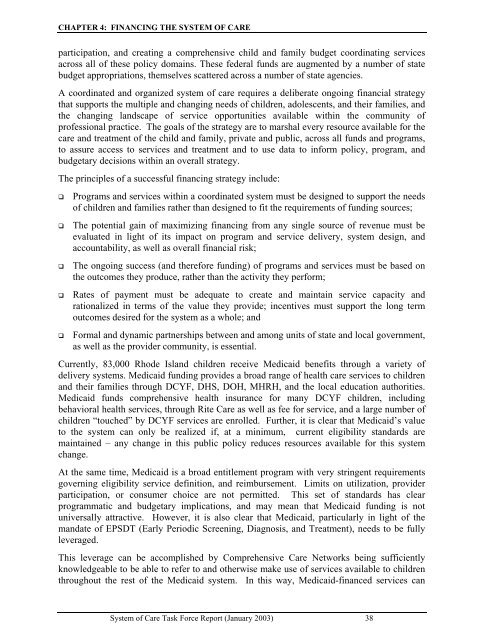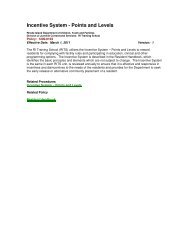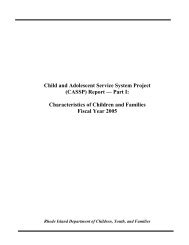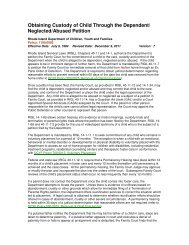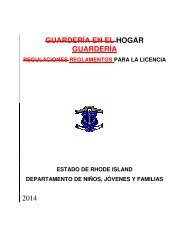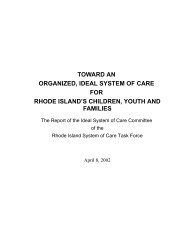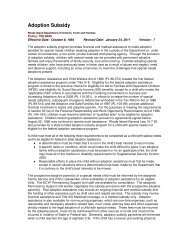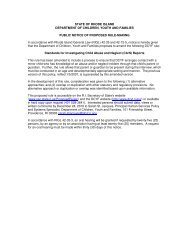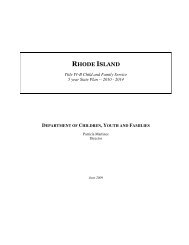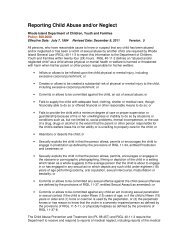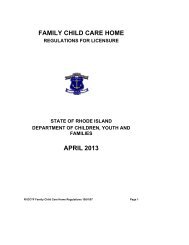Final Report - RI Department of Children, Youth & Families
Final Report - RI Department of Children, Youth & Families
Final Report - RI Department of Children, Youth & Families
Create successful ePaper yourself
Turn your PDF publications into a flip-book with our unique Google optimized e-Paper software.
CHAPTER 4: FINANCING THE SYSTEM OF CARE<br />
participation, and creating a comprehensive child and family budget coordinating services<br />
across all <strong>of</strong> these policy domains. These federal funds are augmented by a number <strong>of</strong> state<br />
budget appropriations, themselves scattered across a number <strong>of</strong> state agencies.<br />
A coordinated and organized system <strong>of</strong> care requires a deliberate ongoing financial strategy<br />
that supports the multiple and changing needs <strong>of</strong> children, adolescents, and their families, and<br />
the changing landscape <strong>of</strong> service opportunities available within the community <strong>of</strong><br />
pr<strong>of</strong>essional practice. The goals <strong>of</strong> the strategy are to marshal every resource available for the<br />
care and treatment <strong>of</strong> the child and family, private and public, across all funds and programs,<br />
to assure access to services and treatment and to use data to inform policy, program, and<br />
budgetary decisions within an overall strategy.<br />
The principles <strong>of</strong> a successful financing strategy include:<br />
! Programs and services within a coordinated system must be designed to support the needs<br />
<strong>of</strong> children and families rather than designed to fit the requirements <strong>of</strong> funding sources;<br />
! The potential gain <strong>of</strong> maximizing financing from any single source <strong>of</strong> revenue must be<br />
evaluated in light <strong>of</strong> its impact on program and service delivery, system design, and<br />
accountability, as well as overall financial risk;<br />
! The ongoing success (and therefore funding) <strong>of</strong> programs and services must be based on<br />
the outcomes they produce, rather than the activity they perform;<br />
! Rates <strong>of</strong> payment must be adequate to create and maintain service capacity and<br />
rationalized in terms <strong>of</strong> the value they provide; incentives must support the long term<br />
outcomes desired for the system as a whole; and<br />
! Formal and dynamic partnerships between and among units <strong>of</strong> state and local government,<br />
as well as the provider community, is essential.<br />
Currently, 83,000 Rhode Island children receive Medicaid benefits through a variety <strong>of</strong><br />
delivery systems. Medicaid funding provides a broad range <strong>of</strong> health care services to children<br />
and their families through DCYF, DHS, DOH, MHRH, and the local education authorities.<br />
Medicaid funds comprehensive health insurance for many DCYF children, including<br />
behavioral health services, through Rite Care as well as fee for service, and a large number <strong>of</strong><br />
children “touched” by DCYF services are enrolled. Further, it is clear that Medicaid’s value<br />
to the system can only be realized if, at a minimum, current eligibility standards are<br />
maintained – any change in this public policy reduces resources available for this system<br />
change.<br />
At the same time, Medicaid is a broad entitlement program with very stringent requirements<br />
governing eligibility service definition, and reimbursement. Limits on utilization, provider<br />
participation, or consumer choice are not permitted. This set <strong>of</strong> standards has clear<br />
programmatic and budgetary implications, and may mean that Medicaid funding is not<br />
universally attractive. However, it is also clear that Medicaid, particularly in light <strong>of</strong> the<br />
mandate <strong>of</strong> EPSDT (Early Periodic Screening, Diagnosis, and Treatment), needs to be fully<br />
leveraged.<br />
This leverage can be accomplished by Comprehensive Care Networks being sufficiently<br />
knowledgeable to be able to refer to and otherwise make use <strong>of</strong> services available to children<br />
throughout the rest <strong>of</strong> the Medicaid system. In this way, Medicaid-financed services can<br />
System <strong>of</strong> Care Task Force <strong>Report</strong> (January 2003) 38


